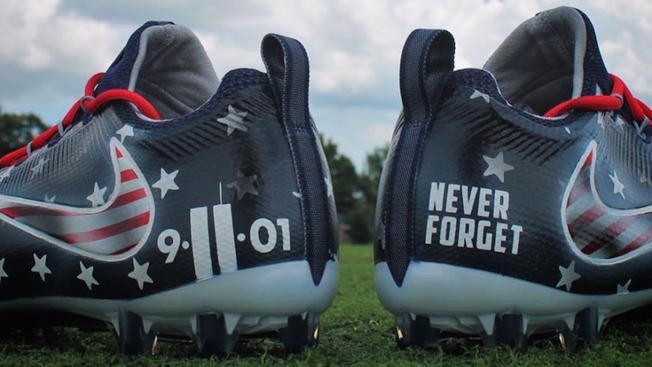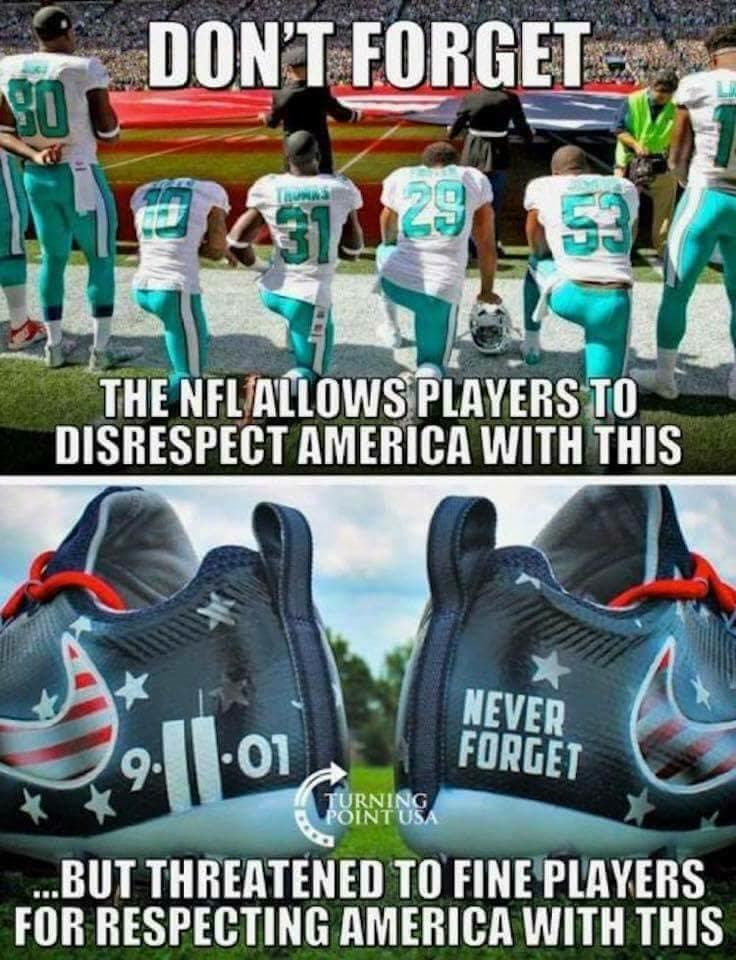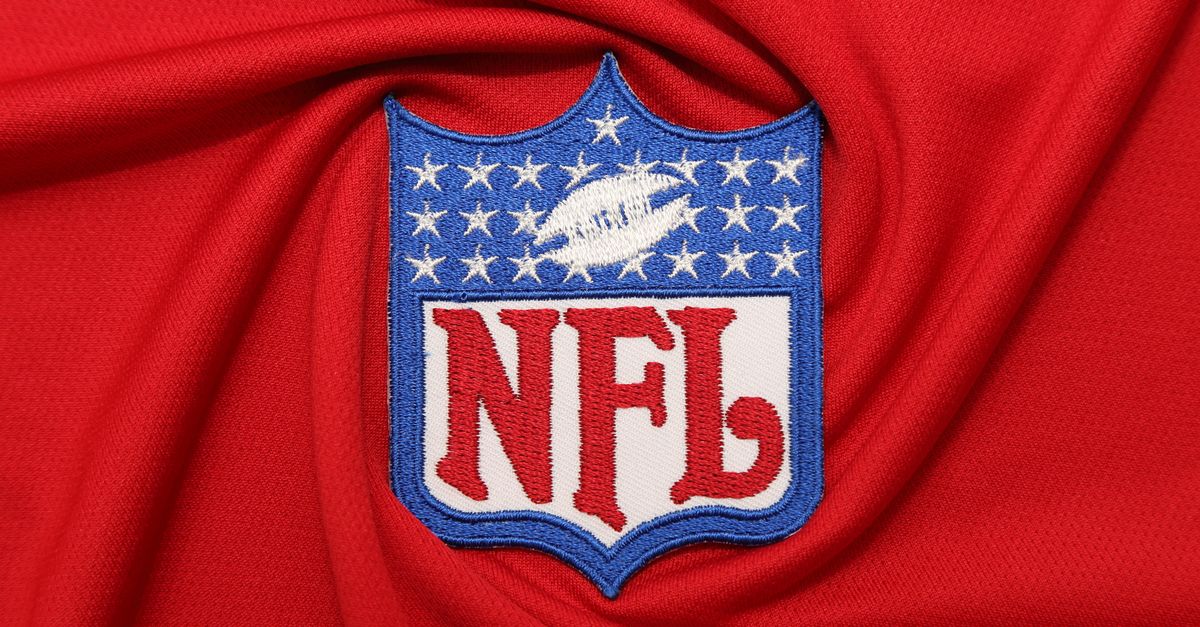The National Football League's management has periodically the target of controversy for suggesting that the league might levy fines against players who — during games played on 11 September — wore helmets, cleats, or gloves adorned with wording and pictures paying tribute to 11 September 2001 victims and first responders:

In neither case were any fines actually enforced, but the negative publicity fostered the image of the NFL as a remorselessly commercial entity, so focused on the bottom line and so rigid in its rule enforcement, that it would penalize players for wanting to take part in an expression of patriotic memorialism to those who died in, and aided victims of, a terrorist attack.
Fast forward to 2017, when players around the league began following Colin Kaepernick's lead in "taking a knee" on the sidelines during the pre-game playing of the U.S. national anthem, or staying in their locker rooms during renditions of "The Star-Spangled Banner." In that case, the NFL specifically stated that they would not discipline those teams and players who refused to be on the field for the playing of the national anthem before games.
This seeming disciplinary disparity prompted criticism that the NFL was acting inconsistently, if not hypocritically:

Does the NFL have a logical — or at least a consistent — explanation for their seemingly differing approaches to patriotism-related activities?
Although the league itself has not made a point of distinguishing between the two controversies, we have noted that the NFL's rulebook specifically prohibits players from altering their uniforms and accessories to include "writing or illustrations" intended to "convey personal messages," including ones that reference "non-football events, causes or campaigns" without prior league approval:
Throughout the period on game-day that a player is visible to the stadium and television audience (including in pregame warm-ups, in the bench area, and during postgame interviews in the locker room or on the field), players are prohibited from wearing, displaying, or otherwise conveying personal messages either in writing or illustration, unless such message has been approved in advance by the League office. Items to celebrate anniversaries or memorable events, or to honor or commemorate individuals, such as helmet decals, and arm bands and jersey patches on players’ uniforms, are prohibited unless approved in advance by the League office.
Unlike the 9/11 memorials — which involves the wearing of (non-approved) customized cleats — the national anthem protests of 2017 have not run afoul of the regulations quoted above, as players engaging in those demonstrations have not modified their uniforms or gear to bear any particular message; their protests have consisted solely of the silent gesture of kneeling on the sidelines while the anthem is played.
Whatever NFL regulations that apparently exist regarding player conduct during the anthem (a subject that is still somewhat murky) reportedly state that players must be on the sidelines while the anthem is played, not that they must stand at that time. (The latter is put forth only as something players "should" do.) Therefore, although they have not done so, the NFL could legitimately claim that one form of expression (wearing customized equipment) is a violation of league rules, while the other (kneeling) is not.
Although the image displayed above specifically questions why players kneeling on the sideline have not been penalized, one might still question whether the NFL could opt to fine players who instead stayed in their locker rooms during the anthem. However, the league might have chosen not to engage in any disciplinary action over the latter action because it was not wholly undertaken as a form of protest, but also as a measure to head off exacerbating the anthem controversy and avoid forcing players to take sides over the issue:
Seahawks cornerback Richard Sherman said the decision to stay in the locker room came after "a long process, a lot of discussions happened, and we took everyone's input."
"As a team, we wanted to do our best to not ostracize our guys, any of our individuals, allow them to feel welcomed and not make them uncomfortable," Sherman said. "That's the worst thing you can do as a teammate is put your teammate in an uncomfortable position. We don't go out, the whole team doesn't come out, then it's easier for him to defend himself and say it's a team decision. 'I just did what the team did.' You're a good teammate, perfect. Fine.
"But if you get out there and you ask a guy to kneel or sit going against his values, going against his family, you know you put him in weird spots," Sherman added. "We never want to do that. We think that we did a good job getting our message out and trying not to distract from it."
The Titans took a similar approach with their statement.
"As a team, we wanted to be unified in our actions today. The players jointly decided this was the best course of action. Our commitment to the military and our community is resolute, and the absence of our team for the national anthem shouldn't be misconstrued as unpatriotic."
The Steelers coach told CBS' Jamie Erdahl before the game that the team wanted to "remove ourselves from the circumstance" and meant no disrespect.
"We're not going to play politics," [Pittsburgh Steelers head coach Mike] Tomlin said. "We're football players, we're football coaches. We're not participating in the anthem today — not to be disrespectful to the anthem but to remove ourselves from the circumstance.
"People shouldn't have to choose. If a guy wants to go about his normal business and participate in the anthem, he shouldn't be forced to choose sides. If a guy feels the need to do something, he shouldn't be separated from his teammate who chooses not to."
Nonetheless, the NFL's enforcement of related rules does seem to be inconsistent to many onlookers. In August 2013, for example, the league fined Redskins quarterback Robert Griffin $10,000 for wearing a t-shirt bearing the words "Operation Patience" during warmups before a preseason game:
Robert Griffin III didn't even play in the Redskins' preseason win over the Steelers, but he did warmup and during warmups he wore a T-shirt that violated the league's apparel rules. That decision is going to cost him.
The NFL has fined RG3 $10,000 for wearing the unauthorized apparel, according to the Washington Post. Griffin wore a T-shirt during warmups that said 'Operation Patience.' Operation Patience is a term RG3 coined as he continues to battle back from the torn ACL he suffered in January.
The 'Operation Patience' T-shirts are made by Adidas and wearing Adidas on the field during pregame warmups is a no-no. NFL rules require players to wear clothing made by Nike, the league's apparel partner.
However, the league apparently took no action against any of the several players who wore shirts bearing the slogan "I'm with Kap" (a nod to Colin Kaepernick) during pre-game warmups in September 2017:
Before their Week 3 game against the Jets, several members of the Dolphins wore "I'm with Kap" shirts during pregame warmups.
According to Armando Salguero of the Miami Herald, Ja'Wuan James, Laremy Tunsil, Jermon Bushrod, Jay Ajayi, Andre Branch, Kenny Stills and Damien Williams all wore the shirt. Chris Perkins of the South Florida Sun-Sentinel reported that Leonte Carroo, Jakeem Grant and Drew Morgan also had the shirt on.
Jermon Bushrod, Laremy Tunsil, Ja'Wuan James wearing their "ImwithKap" t-shirts pic.twitter.com/vnVO9DvaPL
— Chris Perkins (@chrisperk) September 24, 2017
WRs Leonte Carroll, Jakeem Grant & Drew Morgan wearing "ImwithKap" t-shirts pic.twitter.com/z9agRfuVn3
— Chris Perkins (@chrisperk) September 24, 2017
Again, the NFL's differing response to these incidents has fostered the notion among some fans that the league only enforces its own regulations when its commercial interests are threatened, but looks the way when rules are broken in the service of social protest.
As the National Football League grapples with these issues, the one certainty is that however they choose to handle the controversy, they will undoubtedly leave a good many fans and players displeased.
